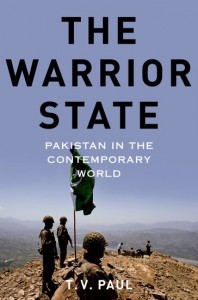Featured Book
The Warrior State: Pakistan in the Contemporary World
 Pakistan ranks 133rd out of 144 countries in global competitiveness, Taliban forces occupy 30% of the country, and it is perpetually in danger of becoming a failed state-with over a hundred nuclear weapons that could easily fall into terrorists’ hands. In The Warrior State, noted international relations and South Asia scholar T.V. Paul tackles what may be the world’s most dangerous powder keg and untangles a fascinating riddle. In recent years, many countries across the developing world have experienced impressive economic growth and have evolved into at least partially democratic states with militaries under civilian control. Yet Pakistan, a heavily militarized nation, has been a conspicuous failure. Its economy is in shambles, propped up by international aid, and its political system is notoriously corrupt and unresponsive. Despite the regime’s emphasis on security, the country is beset by widespread violence and terrorism. What explains Pakistan’s unique inability to progress? Paul argues that the “geostrategic curse”-akin to the “resource curse” that plagues oil rich autocracies-is the main cause. Since its founding in 1947, Pakistan has been at the center of major geopolitical struggles-the US-Soviet rivalry, the conflict with India, and most recently the post 9/11 wars. No matter how ineffective the regime is, massive foreign aid keeps pouring in from major powers and their allies with a stake in the region. The reliability of such aid defuses any pressure on political elites to launch far-reaching domestic reforms that would promote sustained growth, higher standards of living, and more stable democratic institutions. Paul shows that excessive war-making efforts have drained Pakistan’s limited economic resources without making the country safer or more stable. In an age of transnational terrorism and nuclear proliferation, understanding Pakistan’s development, particularly the negative effects of foreign aid and geopolitical centrality, is more important than ever. Painstakingly researched and brilliantly argued, The Warrior State uncovers the true causes of Pakistan’s failure to progress.
Pakistan ranks 133rd out of 144 countries in global competitiveness, Taliban forces occupy 30% of the country, and it is perpetually in danger of becoming a failed state-with over a hundred nuclear weapons that could easily fall into terrorists’ hands. In The Warrior State, noted international relations and South Asia scholar T.V. Paul tackles what may be the world’s most dangerous powder keg and untangles a fascinating riddle. In recent years, many countries across the developing world have experienced impressive economic growth and have evolved into at least partially democratic states with militaries under civilian control. Yet Pakistan, a heavily militarized nation, has been a conspicuous failure. Its economy is in shambles, propped up by international aid, and its political system is notoriously corrupt and unresponsive. Despite the regime’s emphasis on security, the country is beset by widespread violence and terrorism. What explains Pakistan’s unique inability to progress? Paul argues that the “geostrategic curse”-akin to the “resource curse” that plagues oil rich autocracies-is the main cause. Since its founding in 1947, Pakistan has been at the center of major geopolitical struggles-the US-Soviet rivalry, the conflict with India, and most recently the post 9/11 wars. No matter how ineffective the regime is, massive foreign aid keeps pouring in from major powers and their allies with a stake in the region. The reliability of such aid defuses any pressure on political elites to launch far-reaching domestic reforms that would promote sustained growth, higher standards of living, and more stable democratic institutions. Paul shows that excessive war-making efforts have drained Pakistan’s limited economic resources without making the country safer or more stable. In an age of transnational terrorism and nuclear proliferation, understanding Pakistan’s development, particularly the negative effects of foreign aid and geopolitical centrality, is more important than ever. Painstakingly researched and brilliantly argued, The Warrior State uncovers the true causes of Pakistan’s failure to progress.
Reviews
“Pakistan and its army sometimes seem to be the same entity. They are not, and no book other than The Warrior State better places Pakistan’s army and the state in their international and comparative settings. It will be essential to scholars of the Subcontinent and of international and comparative politics, as well as all those interested in knowing why this country became the way it did.” –Stephen P. Cohen, Brookings Institution and author of Shooting for a Century: The India-Pakistan Conundrum
“In The Warrior State, T.V. Paul clarifies why nuclear-armed Pakistan continues to neglect all other aspects of development to maintain military parity with India. Even those who disagree with some of his conclusions will find useful his explanation of Pakistan’s insecurities and the policies they have inspired. This book is a valuable addition to the literature on Pakistan’s dysfunction and that dysfunction’s nexus with militarism and Jihadi militancy.” –Husain Haqqani, former ambassador of Pakistan to the United States and Professor of International Relations, Boston University and author of Pakistan Between Mosque and Military
“The Warrior State is a provocative and insightful review of Pakistan’s tortured politics filled with interesting comparisons to other Muslim and emerging states.” –Bruce Riedel, Director of the Brookings Institution’s Intelligence Project
“T.V. Paul’s book is a timely commentary on Pakistan’s perennial search for stability.” –Shuja Nawaz, Director, South Asia Center, Atlantic Council and author of Crossed Swords: Pakistan, its Army, and the Wars Within
“The Warrior State provides an unusual perspective on the links between Pakistan’s army-dominated political system and the weakness of the Pakistani state, looking at the different experience of some other army-dominated countries. A thought-provoking contribution.” –Teresita Schaffer, retired U.S. Ambassador, Brookings Institution
Hardcover, 272 Pages; ISBN: 9780199322237 New York: Oxford University Press, 2013.
